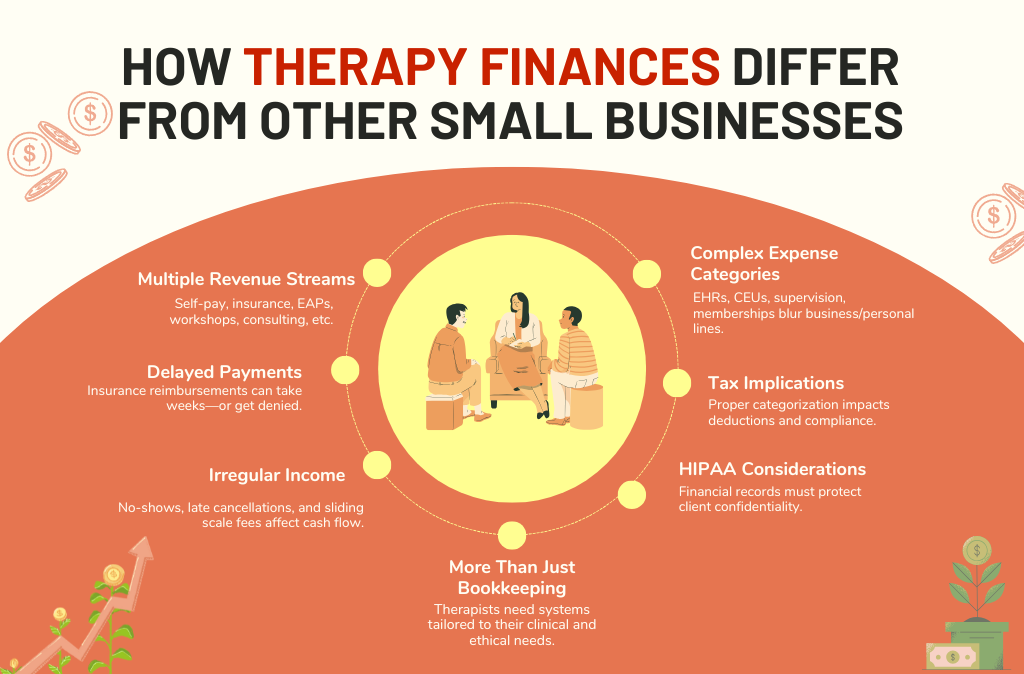In a therapy practice, emotional energy is everything. It’s poured into clients, into clinical decisions, and into continuing education. But outside the therapy room, there’s another layer of complexity, one that doesn’t come up in supervision: bookkeeping.
Unlike traditional businesses, therapy practices manage a mix of session fees, delayed insurance reimbursements, no-show charges, and CPD costs. Financial admin often gets pushed to the margins — late nights with spreadsheets, mismatched numbers, and quiet uncertainty about what’s actually profitable.
For many therapists, bookkeeping isn’t just time-consuming; it’s mentally draining. The pressure to “figure it out” can lead to avoidance, inconsistent records, or tax-time anxiety.
That’s where outsourced bookkeeping for therapists can earn its real value. It’s not just a time-saver — it’s a way to protect the emotional bandwidth that good clinical work demands. And it’s a path toward greater clarity, compliance, and control.
This guide explores what bookkeeping really looks like in a therapy setting and why outsourcing it isn’t a shortcut but a smart, sustainable choice.
Key Takeaways
- Bookkeeping for therapists is not just about keeping records. It helps protect your efforts, gives you a clearer view of your money, and lowers stress during tax season.
- Therapy practices deal with things like late insurance payments, sliding-scale fees, and training costs. These need a bookkeeper who understands how therapy businesses actually work.
- Without support, it’s easy to feel unsure about profits, miss tax deductions, or spend weekends sorting receipts. That pressure can quietly affect your focus with clients.
- A virtual bookkeeper who knows therapy can track your income, organize your expenses, flag missed payments, and prepare everything for taxes, all in the background.
- You don’t lose control when you outsource. You gain clarity. Most solo therapists see big benefits. And while accounting tools help, they don’t replace expert eyes.
- Invedus connects therapists with experienced, fully vetted virtual bookkeepers. They understand therapy work and offer secure, stress-free support for your practice.
How Therapy Finances Are Different from Other Small Businesses

On the surface, a therapy practice may resemble other service-based businesses: clients book sessions, payments are collected, and expenses are tracked. But beneath that simplicity lies a unique financial structure that most general bookkeepers don’t fully understand.
Many therapists work across multiple revenue streams: self-pay clients, insurance reimbursements, Employee Assistance Programs (EAPs), workshops, or consulting. Each of these comes with different timelines, payment methods, and documentation requirements.
For example, insurance payments can arrive weeks after a session, sometimes partially paid or rejected altogether, creating gaps in cash flow and recordkeeping. Some clients cancel late or don’t show, leaving a balance that’s either written off or billed separately. Sliding scale fees, supervision sessions, and CEU reimbursements also complicate income categorization.
On the expense side, clinical software (like EHRs), continuing education, professional memberships, supervision costs, and state licensure renewals often blur the line between business and personal development. Properly categorizing these isn’t just a bookkeeping detail; it impacts tax deductions and overall financial clarity.
And layered on top of all this is the responsibility to handle sensitive client data with discretion. Financial documents linked to client services must be stored and shared in ways that align with HIPAA-conscious practices, even if HIPAA doesn’t explicitly govern bookkeeping.
Thus, bookkeeping for therapists isn’t just about keeping clean books. It’s about creating order within a complex, human-centered business, one where financial missteps aren’t just costly but also emotionally taxing.
Considering A Scenario Where Therapists Don’t Have Bookkeepers (Often a Reality)
It’s a Friday evening…
After a week of back-to-back sessions, a therapist finally sits down to catch up on admin. There’s a note to follow up on an unpaid co-pay. An insurance reimbursement came through, but it’s $40 less than expected. Receipts for a new Zoom license and a clinical training are buried in their inbox. QuickBooks hasn’t been opened all month.

There’s a vague sense of discomfort. The bank balance seems fine, but taxes are coming, and there’s no clear idea of what’s deductible or how much to set aside. The thought of reconciling everything triggers avoidance. It’s easier to push it to Sunday… again.
Whether the therapist realizes it or not, they are facing:
- Disrupted cash flow: Unreconciled reimbursements mean unclear income tracking.
- Tax risk: Missed expenses or miscategorized purchases could lead to overpaying or underreporting.
- Mental clutter: Unfinished bookkeeping adds background stress that bleeds into client care.
- No clear financial picture: Without reports, there’s no way to assess how the practice is really performing or if fee adjustments are needed.
In many cases, the issue isn’t negligence; it’s capacity. The emotional and cognitive bandwidth required for good therapy doesn’t leave much space for consistent financial admin. And over time, that avoidance becomes a silent weight.
Outsourcing bookkeeping for therapists isn’t about giving up their control over finances; it’s about building in systems that protect energy, accuracy, and growth. It starts with acknowledging that good therapy doesn’t run on guesswork.
What a Great Outsourced Bookkeeper Looks Like in a Therapy Practice?
imagine this instead…
It’s the end of the month. The practice is busy, but there’s no stress over the books. A virtual bookkeeper, one who specializes in mental health practices, has already reconciled every session fee, insurance deposit, and reimbursement. The therapist hasn’t had to scan a receipt or touch a spreadsheet.
A report arrives by email with a breakdown of income and expenses, neatly categorized. From CEU fees to therapy room rent and Zoom subscriptions, everything’s logged. There’s a note highlighting that supply costs ran higher than usual this month, a gentle heads-up for budgeting.
There’s no payroll, no onboarding, no back-and-forth about software setup. It’s all handled remotely, securely, and without a single phone call, unless you request it.
What That Virtual Bookkeeper Handles Without Interrupting the Practice?
- Session-based income tracking: Payments from clients, EAPs, and insurance are automatically tracked through integration with EHRs or practice management software.
- Expense categorization, stress-free: The bookkeeper accesses receipts and bank statements securely, assigns each expense accurately, and keeps things audit-ready.
- Late or partial reimbursements flagged: Instead of letting revenue slip through the cracks, these are logged and visible in monthly summaries.
- Tax-ready reporting: Quarterly tax estimates are calculated in real time, and when year-end comes, books are ready to hand over to a CPA, no scrambling required.
- All tools, access, and setup handled: The virtual bookkeeper works through trusted software like QuickBooks or Xero, already trained and certified — no onboarding or systems to manage.
- HIPAA-conscious operations: Files are shared via secure portals, access is role-based, and nothing sensitive is stored improperly.
Bookkeeping for therapists doesn’t need to be overwhelming or in-house. Outsourcing gives you access to a financial professional who understands the unique rhythms of therapy work, from session-based income to compliance-friendly reporting.
It’s a streamlined, collaborative setup that delivers clarity without adding overhead or extra admin to your plate.
Why Therapists Outsource Bookkeeping: It’s About More Than Just Time!

Even for those who value professional help in other areas of life—supervision, admin, legal or guidance; many therapists hesitate to outsource their books. Sometimes it’s because of trust, sometimes uncertainty, and often, a few lingering myths.
Let’s clear those up.
Myth #1: “Outsourcing means losing control of my finances.”
The right bookkeeping partner for therapists doesn’t remove you from your numbers; it helps you see them more clearly. With monthly reports, regular check-ins, and transparent access, outsourced bookkeeping becomes a lens, not a barrier.
Myth #2: “I’m too small to need a bookkeeper.”
Solo practitioners are often the ones who benefit most. With fewer internal resources, offloading financial tracking frees up time for more sessions, better self-care, or simply a break from admin stress.
Myth #3: “It’s too expensive; I should figure it out myself.”
DIY bookkeeping for therapists might seem “free,” but hidden costs add up: missed deductions, late tax penalties, billing errors, and hours of unpaid admin time. Outsourced bookkeeping pays for itself in both money saved and stress avoided.
Myth #4: “A generic bookkeeper is fine; therapy is just another service business.”
A therapist’s income doesn’t look like a consultant’s or a coach’s. From insurance timelines to EAPs and clinical software, the flow of money is more complex and requires a specialist who understands it.
Myth #5: “I already use accounting software; I don’t need a bookkeeper.”
Tools like QuickBooks, Wave, or even the built-in billing features in EHR platforms are helpful, but they don’t replace a trained set of eyes. Software can track transactions, but it won’t spot misclassified expenses, reconcile your accounts, or prepare accurate reports for tax season. Many therapists still spend hours manually correcting errors or wondering if they’re doing it right. A bookkeeper turns that software into a solution, not just another task.
Outsourcing isn’t just a time-saving tactic. For therapists, it’s a move toward professional support, financial stability, and, most importantly, the headspace to focus on healing work without the financial fog.
Worth Reading: Virtual personal assistant for therapy office | Hire Virtual Assistants for Therapists
For All Therapist Entrepreneurs Ready for Less Stress!

Outsourcing bookkeeping for therapists isn’t just about numbers; it’s about clarity, boundaries, and long-term sustainability. When financial admin starts to drain your energy or pull focus from client care, it may be time to delegate.
At Invedus, we’re ISO 27001 certified and committed to secure, reliable support. We carefully source, vet, and train experienced virtual bookkeepers who understand the unique rhythms of therapy practices, from session-based income to privacy-conscious reporting.
You’ll also get to interview shortlisted candidates through our no-obligation hiring process, so you can choose the right fit without pressure or commitment upfront.
Curious about how outsourced bookkeeping could support your practice? Contact us today, and we’ll take it from there!







